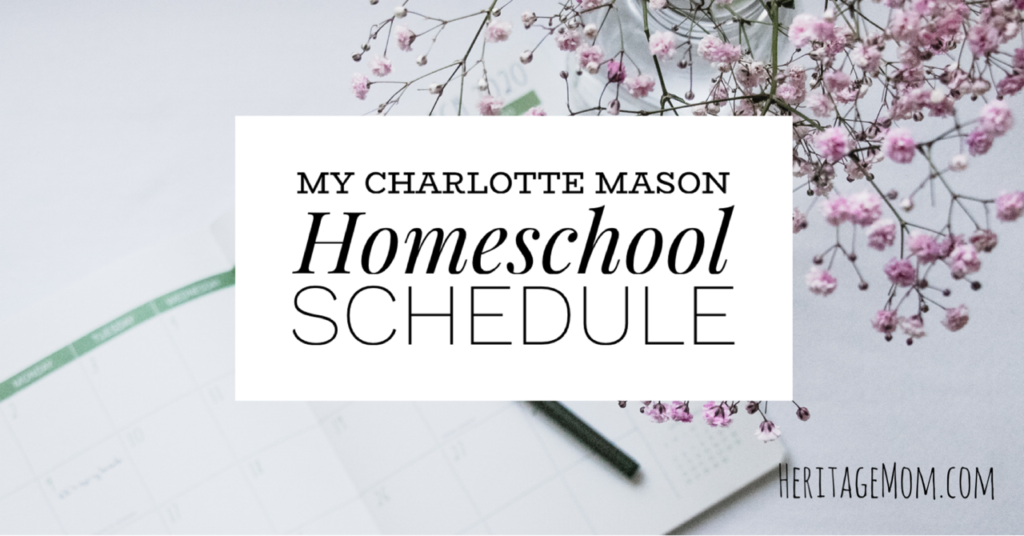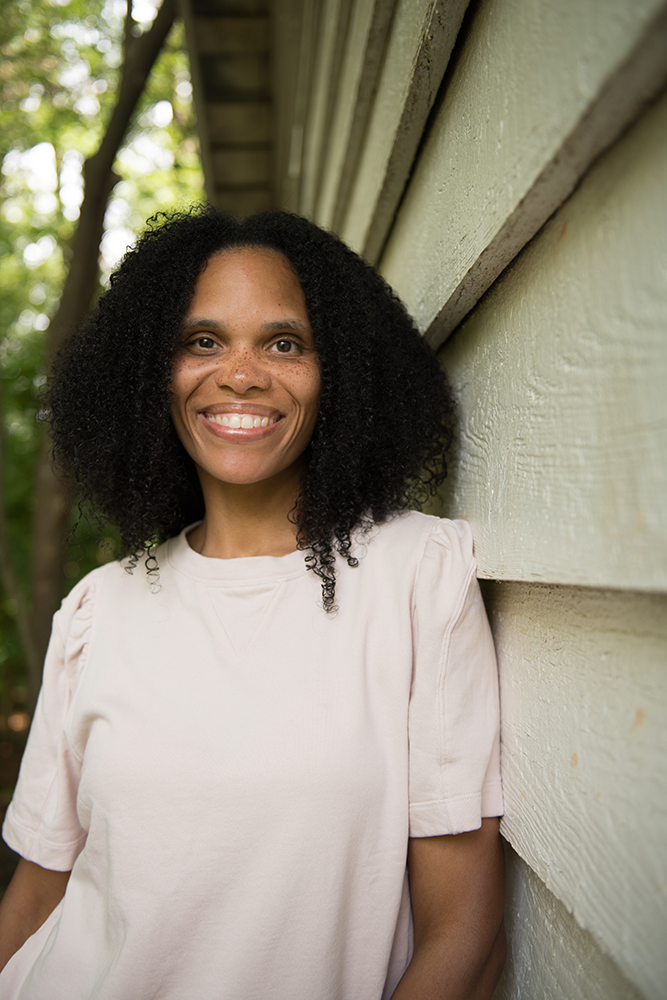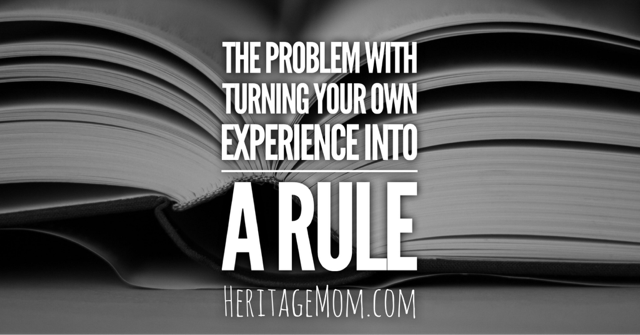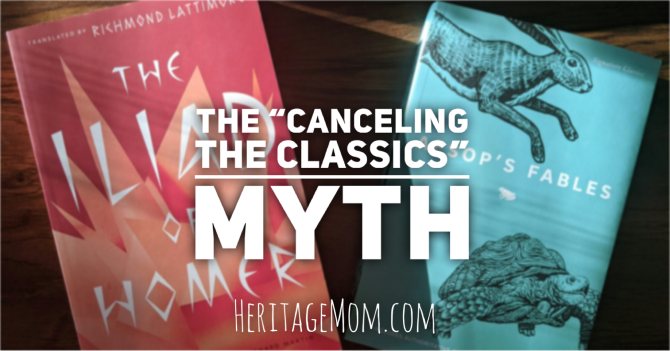A while back, I wrote about Scheduling My Charlotte Mason Homeschool Day, and much of what I shared then still applies. We tweak things each term and definitely year to year, but the general flow remains much the same. In this post, I’m going to focus on the rhythm and rationale supporting my family’s Charlotte Mason homeschool schedule rather than on the independent learning checklists since I’ve covered those before.

When I’m working on a schedule for the new school year, I approach it as an ideal to strive for, not an iron-clad playbook. I make sure that what I put together is possible, but I know that executing it perfectly each day is not probable. I honestly just want to have something fantastic to aim for and work towards, and I don’t think of missing the mark or falling short. I know upfront that our family vibe is more relaxed than the Charlotte Mason homeschool schedule I create and that not following it exactly as written only means that our home is a bustling normal place filled with happy engaged people.
Getting started
I ultimately build my pretty schedule in Excel, but before I type everything in, I take notes on the following:
- Outside activities
- Scheduled in-home activities
- Subjects to study
- Weekly frequency of each subject
- Family vs. independent lessons
Once I have notes on each of these areas, I begin to build my schedule. On one sheet of paper, I create five columns and label them with one weekday each, Monday-Friday. Then I write “Parking Lot” at the top of the second piece of paper.
Step 1
First, I pencil in the outside activities. These are things that take us away from the house on a scheduled basis. This year, our schedule shows the following:
- Mondays: Musical theater (9:30am – 12:30pm) – The practices are actually only 10am – 12pm, but I build in travel time on each end, including the time it takes everyone to get loaded into the car.
- Tuesdays: Piano lessons (9:45am – 11:45am) – Three of my kids have back-to-back lessons (10am – 11:30am) at the piano teacher’s home. She lives nearby so I don’t need to allow much travel time. Each child does an hour of independent work while waiting for their turn, so I have to schedule things differently than during musical theater when they’re occupied the entire time.
- Mondays/Wednesdays (4:45pm – 6:15pm) and Fridays (7:45am – 9:15am) – My oldest works as a farmhand at a homestead down the road. These occur outside of our normal lesson time, but they’re still included because the schedule I create is a complete family schedule vs. just a list of lessons.
- 1st Fridays: Beta Club meeting (10am – 1pm) – My kids join their friends from our homeschool group for a monthly in-person meeting and community service project.
Step 2
Second, I add regularly occurring in-home activities that involve outside people. These are virtual activities or things where the action comes to us vs. us leaving home. Here’s what we have this year:
- Thursdays: Art teacher (10am – 11am) – We have an art teacher who comes weekly to work with my children on various techniques (mostly watercolor).
- 3rd Fridays: Beta club virtual (10am – 12pm) – My kids hop on Zoom to do some sort of leadership activity with their friends and chapter sponsor (a mom from our group).
- Monthly: We have monthly book club meetings, but I don’t put them on the schedule because they occur infrequently. I just note them at the bottom.
Step 3
Third, I write in our family lessons first thing in the morning. These are the things that we all do together, and we refer to it as morning time. It generally includes Bible, hymn study, folk songs, poetry, recitation, composer study, picture study, picture books, geography, current events, and family read alouds. At times, other lessons are also included here. Particularly special books that I want everyone to hear.
Morning time is our favorite time of the day, and I try to put as many subjects as possible into this time. To prepare the morning time portion of our schedule, I write in the subjects that we do daily. Then I add things that we do 3x a week, 2x a week, and finally 1x a week.
Step 4
After morning time, we leave the house for an activity or we roll into a period of independent learning while I work with one or two children at a time. This is the part of our schedule that changes a lot year-to-year because I have to decide which subjects I’m going to do with a certain child and which things they’ll do on their own. My plans for this part of our day change as children mature, little ones begin formal lessons, and we start using new books/resources.
For this year, I generally work with my 8-year-old first and most often because he needs me the most. My 6-year-old hasn’t started formal lessons yet, but he listens in on most things that I read aloud to his brother. While I’m working with my older son on math and reading, my youngest will do a puzzle or play with the puppy. Once I finish up here, the boys are done for the day other than piano practice and their responsibilities around the house (aka chores).
Most days, I then work with each of my girls (10 and 12 years old) separately on math and possibly writing. Once a week, I give my son more independent work, and I spend the whole time with the girls. This is when we do grammar, Shakespeare, Book of Centuries, social justice readings, special topics (We’re currently reading The Omnivore’s Dilemma), and anything else that we want to do together. We’ve taken an online course on puberty during this time, a writing course by S.D. Smith (author of The Green Ember), and plenty of other things that don’t fit neatly into a particular “subject” box. This is a time that the three of us really look forward to because of the fun topics and juicy conversations!
Step 5
Once all of these things are scheduled (out-of-home activities, in-home activities, family lessons, independent subjects, mama/kid subjects), I look at what’s leftover. There are always things on the initial list of subjects I plan to cover that don’t make the final schedule because it’s just too much. I move those things to the parking lot.
Step 6
After I’m happy with the family schedule, I use it to create independent work checklists for each child. I update the checklists each Sunday while accounting for that week’s unique scenarios (dentist appointment, hair braiding, field trip, community service, etc.). After updating, I print copies and clip them to each child’s clipboard. They check things off as they do them, and I go over it each afternoon.
What do you do with the parking lot?
That’s a great question! The parking lot is where I go during the year if I find that we have time to comfortably add a lesson here or there. I also pull from the parking lot if something gets really stale and we need to shake things up at some point. Finally, the parking lot is where I start the following year because I try to prioritize things that we skipped or didn’t do well the previous year whenever I make a new schedule.
How do you handle unplanned activities?
My family loves field trips and hikes with friends. We do both regularly, but I can’t plan ahead for them because they’re fairly ad hoc. We have various friend groups that hike on a regular basis, so we always have someone to hang with, but I don’t like committing to the same day and time every week. I like to be more spontaneous based on our schedule and the weather. And the same applies to field trips. Our homeschool support group is very active, and field trips, enrichment activities, social meetups, or other cool things are regularly added to the group calendar. We try to attend a lot of the activities but not everything!
When we attend an irregular or unplanned activity (or if something else comes up that requires a departure from our regular flow), I just circle those activities on my Charlotte Mason homeschool schedule (I print a new copy each week), so I can remember what we skipped. Then I try to make sure that we don’t skip the same things again and again. If that starts to happen, I reevaluate and edit the schedule because there’s a new pattern that I didn’t account for in the beginning.
Do you make up skipped lessons?
No. We just pick up where we left off and keep moving. At the end of the regular school year (which consists of three 12-week terms along with time off for holidays, vacations, and staycations), we shift gears into what we call “summer learning.” It’s a completely different beast than the regular school year, but there’s still some structure to our days. In the early weeks of summer learning, we finish up any lingering things that we didn’t quite finish during the regular terms.
Or to be more accurate, we finish the things that we WANT to finish. Some things don’t require completion in my book. For example, we’ll definitely finish any historical fiction, biographies, and other novels because everyone wants to know what happens in the end. But if we don’t quite finish a few chapters in a history book or some of the grammar lessons, we don’t continue with those in the summer.
Conclusion
That is my scheduling process in a nutshell. The most time-consuming part is balancing the days with various lessons requiring different amounts of time. I used to figure it all out down to the minute, and I don’t regret doing that because it helped me understand how to mix lesson types and durations to create a Charlotte Mason homeschool schedule that flows nicely. But now that I have more years under my belt, I’m able to go with a looser routine because I have a strong sense of how things will work out. Instead of putting exact times for everything, I tend to think in chunks or buckets of time:
8:30am – Breakfast
9:00am – Morning time
11:00am – Outside activities or Independent work and 1-2 kids have lessons with Mama
12:30pm – Lunch
1:00pm – Independent work and 1-2 kids have lessons with Mama (as needed)
2:00pm – Playtime/Afternoon occupations
6:30pm – Dinner
9:00pm – Bedtime (Lights out for the boys, Silent reading for the girls)
That’s all! Please let me know in the comments if you have any questions about how I build my Charlotte Mason homeschool schedule.
You can find me hanging out on Instagram @heritagemomblog. I hope to see you there!






Hi Amber! Thank you so much for sharing your days in detail! I’m finishing my 4th year homeschooling and creating a schedule/rhythm is no easy task, so well done! I am curious on the days your children have musical theater, do you still have family subjects and individual subjects when you get home or is it a lighter day? Thank you again for sharing all of this. I love and appreciate when homeschool moms go into detail about their days, especially with multiple children in different ages and stages. 🙂
On musical theater days (Mondays), we do a condensed morning time between breakfast and the time that we need to head out the door. What we do varies, but it’s usually Bible, hymn, and poetry. Short and sweet. When we get home, we have lunch and do a science experiment (I subscribe to MEL Science kits because I could never seem to pull everything together on my own). Then the kids do math, read one or two subjects, and practice piano. Then they’re done. So we do continue lessons when we get home, but it’s also a much lighter day. I don’t attempt to make up all that we would’ve done if we’d stayed home. This is partially because it would make the day much too long, but it’s also because my kids don’t want to participate in any outside activities if they still have to do all of their lessons that day. As my oldest once said, “It feels like I’m being punished for trying something new.”
Hey Amber thank you for the great blog post. What do the girls do during the early part of the day when you’re working with the boys? Can you share some more of the extra Activities you do with the girls? Can you also share good independent reads that the girls have done? I was struggling with finding appropriate reads for my rising fourth grade African-American girl that don’t involve boys, love interests, kissing etc.
When I’m working with the boys, my girls will read their lesson books that we don’t do together (devotional, biography, historical fiction, science, world history, etc.). They’ll also work on written narrations, copywork or hand lettering, typing, foreign language, handicrafts, and piano practice. They can also do their math if they don’t need me to give them a lesson. They don’t do all of these daily, but I spread them out across the week. With the girls, I usually have some sort of topic that we’re digging into. This year it was learning about our food systems and where our food comes from (through books and documentaries), puberty (I linked the course we took above and we also read books), and various social justice topics. Sometimes we watch videos on a topic that has come up during the week (homelessness, internet safety, immigration, etc) or we take a different type of online course together. This time really varies, but it’s very consistent because we begin our time with some of the weekly lessons that we always do together (mentioned above). In terms of books, you can enter the following in the search box here on my site: Tween Devotionals and Fun Novels I Can Trust, Chapter Books: Black Girls Just Being Kids, and 20 Middle Grade Books: Black Girls Living Life (stick with the top row for 4th grade). You can also check out our past book club reads: https://heritagemom.com/heritage-homeschoolers-book-club/. I hope this helps!
Just responding with book thoughts! The Anna Hibiscus series is delightful :). And Karen English’s Nikki & Deja series, plus Carver Chronicles and J Dillard’s J. D. the Kid Barber series, also look like great ones to explore, though we haven’t read them yet. Alexander McCall Smith also has a young-reader geared series called Precious Ramotswe Mysteries – a young girl sleuth, set in Botswana.
Very best wishes discovering treasures your family loves.
These are great options!
I cannot believe how amazing you are. Thank you for this. I would also love to see your summer schedule. I cannot homeschool right now, but I fully intend on summer-homeschooling my kids!
You’re welcome! I’ll write a post about our summer schedule soon, but here’s a quick overview: We read good books, do a special study (“Sweet Tea & Cookies” in my shop is an example), take a road trip to visit some cool historical site, and dig into some sort of creative project or activity (i.e. making soap, woodworking, etc.). We have a daily routine, but we don’t pass up any opportunities to go swimming or to the lake with friends. My kids all think that summer learning is the best time of the year, so it’s definitely fun but they’re learning a lot.
This is so helpful Amber. Thank you! I know it’s a little off topic because you just mention this in passing at the top of the post, but can you possibly share a bit more about the Beta club service projects? I’d love to learn what your group does for service (that works for many ages of children). Trying to plan some service for next year and feeling a tad stumped. Thanks for any thoughts.
Hi Ashley, I’m glad that you found it helpful! We’ve done a ton of volunteering through our local YMCA. They have days when our group can come in and make sandwiches, pack lunches, and deliver them to local motels during public school breaks (for residents who normally would receive free lunch if school were in session). The YMCA also has days where we can help organize and distribute toys for Christmas or food during drive-by food pantry days. They organize virtual storytimes for local preschools, and the kids & parents in the group can volunteer to log in and do a great read-aloud via zoom for the preschoolers. Basically, the YMCA has a TON of options. Outside of that, we check with our local homeless shelter for needs, and we come together to meet those. Some things that they’ve needed in the past: Bag lunches and plasticware rolls (to put inside the to-go lunches that they make on-site). We’ve done doll drives for an organization that serves families that are fostering, and then we helped organized the dolls in their warehouse along with other donations. Some of our Beta Club hours are done as a total group, some are done as smaller groups, and some are done as individual families, but the ones I named here are all good for a group.
Hi! This was very helpful. One thing I’m really having a hard time with is when to have kids do their chores. What do you guys do? If we do them in the morning, I feel like it takes away from school. If we wait till the afternoon, I feel like the kids should get to play or we’re pooped. What do other homeschoolers do?? Ha!
We sprinkle them throughout the day! My early riser unloads the dishwasher when he wakes up. Then we do breakfast and morning time. Then a kiddo loads the breakfast dishes. Then more school and someone loads the lunch dishes. Then wrap up school, play, and then whatever else is scheduled to be done that day (We have a list). And then someone loads the dinner dishes. So we don’t have one set time where everything is done at once.
Hi Amber. Thank you for this post and all of the resources on the site. We made the decision to homeschool our children in 2022. I am doing my best to find a balance between what is true and what are social pressures. As a Christian black woman in western Connecticut, with very few other moms of color who are homeschooling with a Christian foundation… (and parents who would like to see our girls in private school) I am struggling to figure out what is best for our family academically and socially. Our girls just turned 3 & 5. Our 5-year-old is reading, loves workbooks, structure and has memorized more Bible versus than I knew at 30. Our 3-year-old is all about free and imaginative play (as she should be). We created a playgroup at our home with 13 regular attendees once a week and the girls have activities they love once or twice a week, like swimming lessons, Lego League and ballet. 1. What age or maturity level would you create a formal learning schedule? (I really struggle here. My loving husband says that they are learning, but I don’t know how deep that learning should be versus where it is now. 2. Do you have suggestions on overcoming the external and internal pressures of traditional schooling/scheduling? 3. What would change in your schedule or approach to homeschooling if your children didn’t have a thriving community with diverse representation (meaning where your children were also seen and welcomed as image bearers?)
Grateful for you.
Hi Ann! I’m so glad that you found me here. 1) I start a more formal schedule when my children turn 6, and I officially consider 1st grade to begin the August after that 6th birthday. So my youngest turned 6 in Nov 2021, and he started 1st grade with me in Aug 2022. Before that official start, we’re doing all of what you’re doing – reading, playing, nature, exploration, field trips, etc. 2) Find local moms who are completely in love with home education because they will give you vision for how beautiful this lifestyle can be. If you can’t find them locally, follow a few that you can learn from and be inspired by online. Read their blogs or social media posts and read their books. Listen to podcast interviews or hear them speak in person. Not a million voices – just a few. The ones that are living the way you see yourself living. This is an alternative lifestyle, so it can be difficult to build confidence if you don’t have others lighting your path. 3) Our in-person community is extremely valuable, but we didn’t have it when my kids were your kids’ ages. I share that to say that you shouldn’t give up on finding or creating that type of community. It may be gifted to you when you least expect it. But also, the things you choose to anchor in your home – books, music, art, poetry, etc. – will go a very long way toward helping your children feel seen and valued. Don’t rely on a single curriculum to give you what your kids need because it won’t happen. Find joy in curating beautifully diverse resources (and finding others who have already done a lot of it) because that will always be part of your responsibility as their mom. It’s not easy, but it is SO worth it.
Popping back in to share this quote from Charlotte Mason (Volume 1, Home Education, pg 43):
With all the pressure to give our children a good education and adequate socialization, it’s good to remember that a mother’s first duty should be to provide a secure, quiet early childhood. For the first six years, children should have low-key schedules so they can just be and grow, and they should spend most of their waking hours outside enjoying the fresh air. This is not just good for their bodies; their heart, soul and mind are nourished with exactly what they need when we leave them alone in a stress-free environment among happy influences that give them no reason to rebel and misbehave.